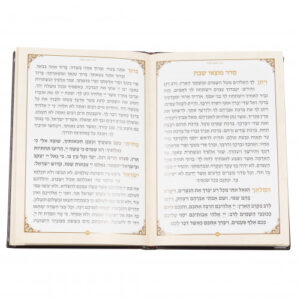
SHABBOS ZMIROS
“I work hard shopping, cooking, and preparing the Shabbos meals. The least you can do is make sure
that we are singing beautiful Shabbos Zmiros!”
This is a scene that plays out in both America and in Eretz Yisroel. The mother, or wife is not too pleased
with the lackluster Zmiros performance at the Shabbos table. The husband and the young men,
however, may have other things on their mind.
It is, however, a much more serious topic than most of us realize.
SPIRITUAL EFFECT
A great Rosh Yeshiva in Eretz Yisroel once said that his children did not become outstanding Talmidei
Chachomim because he did not sing Shabbos Zmiros at the table and had learned instead. His
neighbor’s children, however, did become remarkable Talmidei Chachomim. His neighbor was a pashut
Yid, but he paid special attention to the Shabbos Zmiros. The Rosh Yeshiva knew this because he lived
next to him and could hear the singing every Shabbos. The Shabbos Zmiros clearly have an effect on the ruchniyus of the home.
THE ANGELS
The Rambam in his Mishna Torah (Yesodei haTorah 2:7) lists the ten levels of angels: 1)The chayos 2)
the ofanim; 3) the er’elim; 4) the chashmalim; 5) the serafim; 6) the mal’achim; 7) the elohim; 8) the
sons of the elohim; 9) the keruvim; 10) the ishim.
Every day, the holy chayos sing Zmiros to Hashem – all except one day. They cannot sing on Shabbos.
This is all according to the Midrash cited by Tosfos in Sanhedrin (37b).
Who then sings instead?
It is Klal Yisroel – and the main Zmiros that are sung are at the three meals on Shabbos. Clearly, we have
to take these matters much more seriously than we have done in the past.
EFFECT OF THE MIDRASH ON SHACHARIS
According to the Ohr Zaruah (Shabbos 42:4), there are a number of repercussions of this Midrash on our
Shabbos davening. We have a longer Kedusha because of it, we say a longer Psukei D’Zimra on
Shabbos. We also add more Tefilos after Barchu.
If this Midrash have had such an impact on the Tefilos – then certainly we should give it much more
weight than we have been up until now.
The Midrash in Shir haShirim Rabbah (8:16) states that “When Yisroel eat drink bentch and sing to
Hashem – Hashem will listen.
The Shulchan Aruch (Orech Chaim 670:2) rules that when one sings at the Shabbos table – it is
considered a Seudas Mitzvah.
A Chassidish Rebbe once commented that Shabbos Zmiros are the wings that carry the Shabbos Seudah.
The Aishel Avrohom (281:1) writes that when one eats good foods on Shabbos, Hashem gives shefa
bracha in the form of goshmius. He also adds that whomsoever engages in Zmiros gets shefa bracha in
ruchniyus – spirituality.
The Chasam Sofer used to sing each and every one of the Zmiros without exception.
The Sefer Chassidim of Rav Yehudah haChassid says that the pasuk in Bereishis which states that
Hashem blessed the Shabbos refers to the singing of Shabbos. He proves this from Psukim in sefer Iyov.
The point is that the fact that Shabbos is the source of blessing comes from the song within it.
The Pele Yoetz states that singing Zmiros is a form of Avodas Hashem. Most meforshim understand that
he is referring to Shabbos.
All of the above should inspire us to greater heights in our Shabbos Zmiros.